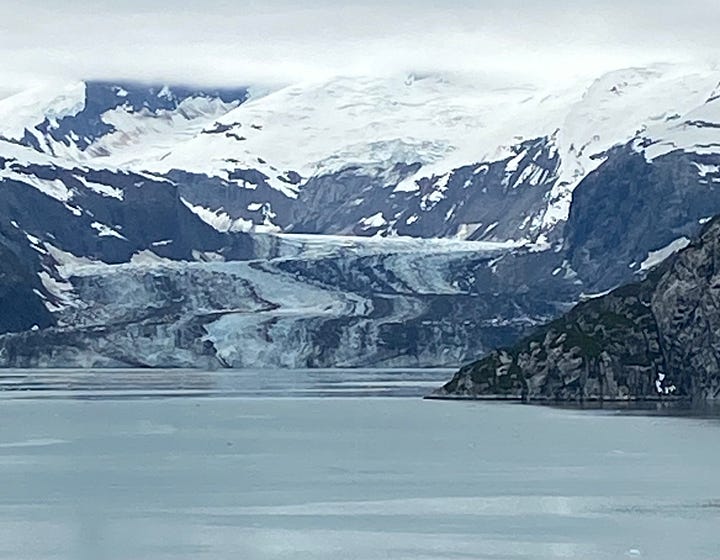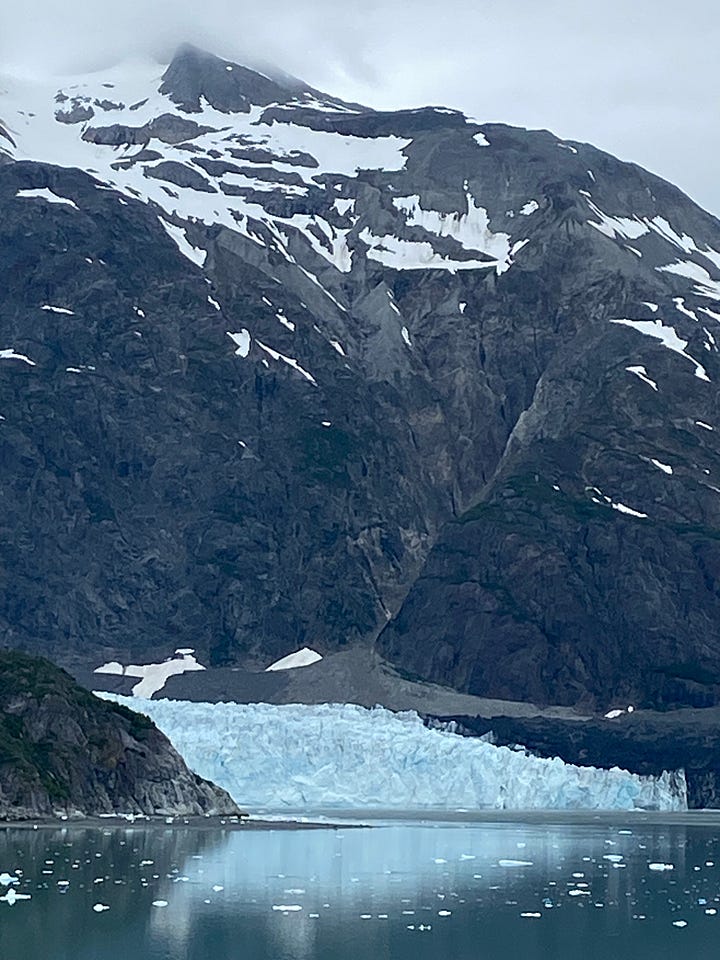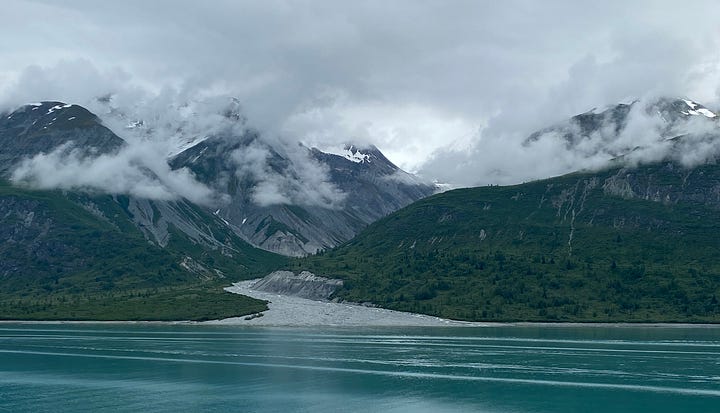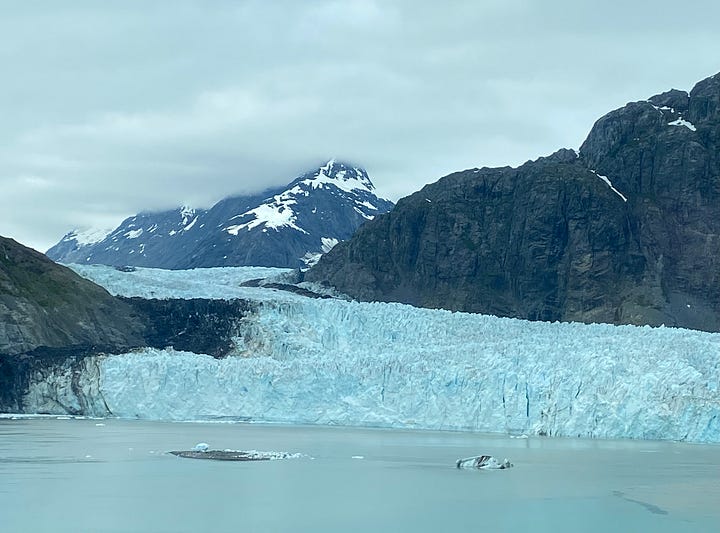I’ve been gone awhile. During my absence, I sailed Alaska’s Inside Passage with my family for a summer vacation. After that, we flew to Las Vegas for what was supposed to be three nights of shows and attractions. I’d wanted to spend more time in nature, maybe take a side trip to Vancouver, but my husband had opposed this idea.
“We’ll be sick of nature by the time we get off the ship. And Vegas,” he said, “is the antidote to too much nature.”
I agreed. Not because I actually agreed with him, but because I’m trying to be a more agreeable sort of person.
We arrived to a heat wave of 118 degrees in Las Vegas. You’d think this temperature might’ve warmed me. It didn’t. I exited the airport buried beneath layers of clothing: denim jacket, mismatched socks grabbed out of carry-on luggage, and makeshift gloves fashioned from the plastic wrappers that previously held KN95 masks. I shivered and shook all the way to our hotel where I learned I had both a high fever and Covid.
This was my first dance with the virus—the current variant is called FLIRT—and I hoped it would live up to its name, proving itself to be a quick encounter. Playful even.
Nope.
The virus did not come for a brief escapade. It still lingers. I ended up stuck in Vegas for a very expensive 7 nights, with the hotel fee rising nightly. “Rates fluctuate,” the hotel manager explained. He pretended to care and cut $200 off the nightly expense. A gesture of Covid sympathy. He even came to visit twice during my extended stay, pounding down my door with hotel security at his side. “We need you to open up. This is a wellness check.”
I assume they wanted to make sure the room wasn’t occupied by sex traffickers or murder victims. Which it wasn’t. Obviously.
As it happens, sexual abuse and attempted murder became The Covid Theme of my Vegas Sick-cation anyway. First came the breaking news about Alice Munro’s complicity in the sexual abuse of her daughter, Andrea Skinner. Then, the attempted assassination of former President Trump.
I should’ve stayed in Alaska. While there, I’d toyed with fantasies about the place despite it being too rugged for my personal aesthetic. I love nature, but I prefer to feel held inside of it, as opposed to feeling like an outsider looking in. The Alaskan wilderness is too remote and severe. It’s not the cuddly blanket of rolling green hills dotted with wildflowers. I want the cozy embrace of a green forest, canopied and quaint. But if worst comes to worst, I’ll take anything, and if the Jews could make the desert bloom, perhaps we can charm up the polar region too.
Certainly, there’s space to be had. We could move all the Jews far from their genocidal neighbors. Our adult son, T, would be comforted by such a plan. While we were traveling, he spent the week in New York and New Jersey with our cousins, including Yasmin, who survived the massacre.
After hearing her stories in person, T grew more and more convinced that staying in Israel is simply too dangerous. But how can the world expect the Jews, the indigenous persons of Judea, to pick up and start all over again? It’s unfathomable.
I entertained the fantasy regardless, ultimately deciding that Alaska is full of other vicious predators: bears and wolves and winter’s darkness.
“Alaska’s not the right fit,” I told my husband while chugging coffee from the deck of our cruise ship. We were sailing in Glacier Bay National Park that morning, and I’d returned to my official Pirate Plan. I poked my husband’s arm and pointed at an upcoming glacier. “I’m back to my original proposal. This is pretty, but it’s not the right investment.”
“What are you talking about?”
“The Jewish future,” I explained. “Our future.”
My husband managed half a smile. I couldn’t tell if he faked amusement or really wanted to hear me out, but I was unstoppable. I’d share my thoughts, and where could he go? He was stuck on a boat with me.
“The Jews need to build ships. We can call our fleet Noah’s Ark 2.0. It’s inevitable. We’re gonna be pirates in the diaspora. We can farm onboard. Carry livestock. And when climate change floods the land, we’ll be safe and sound. Plus, there’s biblical precedent.”
He shook his head. “And when Russia shows up with a nuclear submarine?”
“That’s already taken care of,” I said. “We’re going to invent nautical invisibility forcefields. Nobody will find us.”
“I’m not hiding from anyone,” he said.
Our conversation, on the surface, sounded like a fantasy, but hidden inside was a real argument. A bystander wouldn’t have noticed. Unless said bystander had also witnessed the previous night’s debate, which was the very opposite of scenic cruising.
I’d been in our cabin, sorting dirty clothing for laundry service, when our teenage daughter, S, ran into the room, fists clenched and cheeks flushed. She looked angry. Angry but afraid.
“I’m so mad at dad,” she said.
She explained what had happened. They’d been lounging in the Horizon Lounge, an observation area, when a staff member started a conversation with my husband. He asked my husband where he was from. And my husband told him the truth: I’m from Israel.
This was not the agreed upon plan. Before we’d even stepped foot onboard, my daughter had begged him not to speak in Hebrew. And not to share his Israeli identity.
My husband is not one to hide. I’m not either. But my daughter was genuinely afraid. Plus, antisemitism is something her generation sees across social media on a daily basis. I see it in the writing community as well. My husband’s line of work, on the other hand, doesn’t concern itself with any of this rhetoric. In many ways, he’s still living in a bubble. Our realities are not in alignment, which causes us to suffer different degrees of safety in the world. It’s hard to know what’s real versus imagined under the ongoing threat of antisemitism.
We’d spent the rest of the previous night bargaining. Our daughter had shed actual tears. She’d expressed worry and concern that the cruise employee would hunt down my husband and hurt him. “I heard you tell him our room number. Why would he ask you for your room number? And after you told him you’re Israeli?”
I took my daughter’s side. “People are crazy,” I argued. “And why do we need to be worried about this while on vacation? What’s the benefit?”
Eventually, my husband agreed to keep his identity underground. But while I’d won the immediate argument, I didn’t enjoy any triumph. Instead, I wondered how we’d come to this moment? We’d spent thousands of dollars on a voyage we’d looked forward to, but now, we traveled with vulnerability. With fear.
In the early aughts, after the US invasion of Iraq, I’d experienced prejudice while traveling as an American overseas, even getting spit on by a Frenchman in Toulouse, and I remember how some American backpackers would decorate their belongings with Canadian luggage tags in order to avoid any potential conflict abroad. But antisemitism feels different. It’s a hatred that extends deeper than one’s address.
We see that now. It doesn’t matter that my husband, through no consent of his own, was born in Israel. It also doesn’t matter that he has lived in the United States for the last 40+ years. He’s a Jew. And we see how Jewish hatred has risen up around the world in the aftermath of October 7th.
I’ll end on a question:
If you and/or your Jewish family has traveled or planned to travel abroad this summer, how are you going about things? Are you wearing Jewish jewelry? Are you speaking Hebrew outside? How is everyone managing?
Please let me know. I’d love to hear how others are making their way through the world right now.
Thanks for reading!
All the best,
Jen











This reminded me of the book "The Yiddish Policemen's Union":
https://en.wikipedia.org/wiki/The_Yiddish_Policemen%27s_Union
I am proud to be Jewish. I will be traveling this summer and will not have any jewelry or signs of being Jewish, but I am happy to share my religion and viewpoint should it come up, even when the listener may or may not be happy about it. I have not owned a Jewish star for years. As a personal choice, I am not intentionally purchasing something now to prove myself as this has not been my aesthetic for decades. Jen, I have been enjoying your writing. Thank you for sharing about this personal and globally fraught issue of anti-semitism.